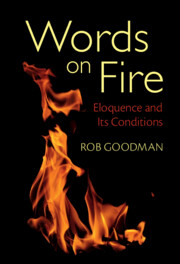Book contents
- Words on Fire
- Words on Fire
- Copyright page
- Dedication
- Epigraph
- Contents
- Acknowledgments
- Introduction: “Just Words”
- PART I Eloquence and the Ancients
- 1 “I Tremble with My Whole Heart”
- 2 The Parthenon and the Outhouse
- Postscript: Quintilian, Tacitus, and the Problem of Large-Scale Decorum
- PART II Eloquence and the Moderns
- Bibliography
- Index
1 - “I Tremble with My Whole Heart”
Cicero on the Anxieties of Eloquence
from PART I - Eloquence and the Ancients
Published online by Cambridge University Press: 16 December 2021
- Words on Fire
- Words on Fire
- Copyright page
- Dedication
- Epigraph
- Contents
- Acknowledgments
- Introduction: “Just Words”
- PART I Eloquence and the Ancients
- 1 “I Tremble with My Whole Heart”
- 2 The Parthenon and the Outhouse
- Postscript: Quintilian, Tacitus, and the Problem of Large-Scale Decorum
- PART II Eloquence and the Moderns
- Bibliography
- Index
Summary
Chapter 1 engages in a close reading of the most important Roman work on eloquence, Cicero’s De oratore. In the face of the late-stage crisis of the Roman Republic, Cicero reconceives oratorical virtus as a capacity to endure risk in confrontation with an unruly public. From this reconception flows a rejection of systematized rhetoric, in which Cicero valorizes the uncertainties of language: the absence of predictable, manipulable links between speech and audience response. This model of eloquence stresses the unreliability of the orator’s persuasive tools and claims that it is the very possibility of failure that makes oratory worthwhile, virtuous, and even interesting. The pursuit of eloquence pushes Cicero toward a surprising stress on the autonomy of the audience. It is just because Cicero stresses the difficulty of eloquence that he finds himself invested in constructing an unpredictable and unconstrained public. Though he was no democrat, his treatment of eloquence is relevant to democratic theory because of the unexpected pressures it places on his elitism. Cicero’s critique of technical rhetoric also anticipates dissatisfaction with the contemporary routinization of rhetoric. The chapter contrasts this view with the more rationalized model of speech developed in De analogia, Julius Caesar’s work on style.
- Type
- Chapter
- Information
- Words on FireEloquence and Its Conditions, pp. 23 - 50Publisher: Cambridge University PressPrint publication year: 2021

